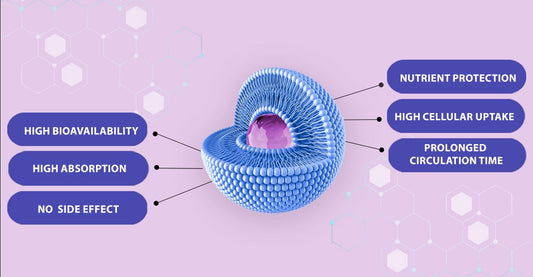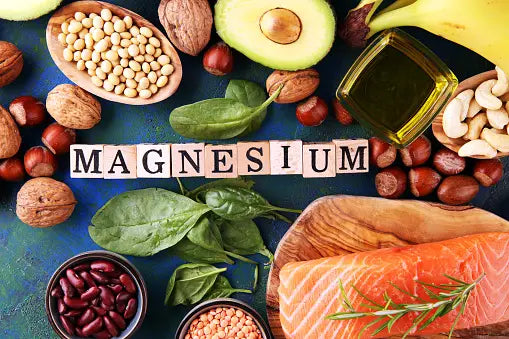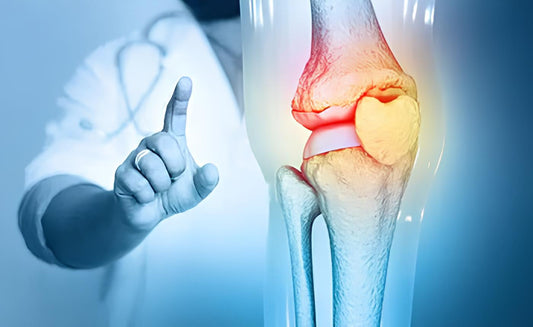

Liposomal Magnesium for Muscle Cramps: Unraveling the Mystery
Table of Contents
Muscle cramps are the body's way of telling us that something isn't quite right. Whether it's due to overexertion, dehydration, or an underlying health condition, these sudden and painful contractions can disrupt our daily lives. For years, magnesium has been hailed as a natural remedy for muscle cramps.
However, recent advancements in supplement technology have given rise to liposomal magnesium, a form of the mineral that claims to offer superior absorption and, subsequently, more effective relief from muscle cramps.
In this blog post, we'll explore the science behind muscle cramps, the role of magnesium in our bodies, and how liposomal magnesium might just be the breakthrough we've been waiting for.
How Liposomal Magnesium Works to Prevent Muscle Cramps
Liposomal magnesium is a form of magnesium supplement that incorporates liposomes, which are tiny lipid (fat) molecules, to enhance the absorption of magnesium in the body. Magnesium is an essential mineral involved in various physiological processes, including muscle function. Muscle cramps can occur due to magnesium deficiency, among other factors. Here's how liposomal magnesium might work to prevent muscle cramps:
- Enhanced Absorption: Liposomal magnesium supplements are designed to improve the absorption of magnesium in the digestive system. Magnesium absorption can be limited by the body's ability to break down and absorb the mineral in the digestive tract. Liposomes can encapsulate magnesium molecules, protecting them as they pass through the digestive system and potentially enhancing their absorption into the bloodstream.
- Rapid Delivery: Liposomes can facilitate the rapid delivery of magnesium into the bloodstream. This quick delivery to cells and tissues, including muscle cells, ensures that magnesium is available when the muscles need it most, potentially preventing muscle cramps.
- Maintenance of Electrolyte Balance: Magnesium is an essential electrolyte, along with sodium, potassium, and calcium. Electrolytes play a crucial role in muscle contraction and relaxation. When there is an imbalance in electrolytes, muscles can contract involuntarily, leading to cramps. By providing an efficient source of magnesium, liposomal magnesium supplements may help maintain proper electrolyte balance, reducing the likelihood of muscle cramps.
- Muscle Relaxation: Magnesium acts as a natural muscle relaxant. It helps muscles relax after contraction. When magnesium levels are adequate, muscles are less likely to contract excessively or involuntarily, reducing the occurrence of cramps.
- Prevention of Neuromuscular Hyperexcitability: Magnesium deficiency can lead to neuromuscular hyperexcitability, where nerves are more likely to send signals that cause muscles to contract. By ensuring an adequate supply of magnesium, liposomal magnesium may prevent this hyperexcitability, reducing the occurrence of muscle cramps.
It's important to note that while liposomal magnesium supplements may offer enhanced absorption compared to some other forms of magnesium supplements, individual responses to supplements can vary. Additionally, consulting a healthcare provider before starting any supplementation is essential, especially if you have underlying health conditions or are taking medications, as they can interact with magnesium supplements.

Science Behind Liposomal Magnesium for Muscle Cramps
Liposomal magnesium is a form of magnesium supplement that combines magnesium with liposomes, which are tiny lipid (fat) particles. These liposomes are designed to enhance the absorption of magnesium in the body. Magnesium is an essential mineral that plays a crucial role in various physiological processes, including muscle function, and it can be helpful in preventing muscle cramps when taken in appropriate amounts.
Here's a breakdown of the science behind liposomal magnesium for muscle cramps:
Magnesium and Muscle Function:- Magnesium is an electrolyte that is vital for muscle contraction and relaxation. It helps regulate the flow of calcium in and out of muscle cells, which is necessary for muscle contractions to occur and then stop.
- Deficiency in magnesium can lead to muscle spasms, cramps, and even muscle weakness.
- Liposomes are microscopic vesicles made of lipids (fats) that can encapsulate and protect the magnesium molecules.
- The liposomal delivery system is thought to enhance the bioavailability and absorption of magnesium in the digestive tract. This is because liposomes can pass through cellular membranes more easily due to their lipid bilayer structure.
- The liposomal technology used in magnesium supplements aims to protect the magnesium from degradation in the stomach's acidic environment.
- Once in the small intestine, liposomes may fuse with the cell membranes, facilitating the transfer of magnesium into the bloodstream.
- There is limited scientific research specifically examining liposomal magnesium for muscle cramps. Most studies on magnesium's role in muscle function and cramp prevention use various forms of magnesium, such as magnesium citrate, magnesium oxide, or magnesium sulfate.
- While liposomal technology has been used successfully to improve the absorption of other compounds, such as certain vitamins and drugs, its effectiveness for magnesium absorption in the context of muscle cramp prevention is still an area of ongoing research.
It's important to note that the effectiveness of any magnesium supplement, including liposomal magnesium, may vary from person to person. Factors like the individual's magnesium status, overall diet, and the presence of underlying medical conditions can influence the outcome.

How to Take Liposomal Magnesium for Muscle Cramps?
Liposomal magnesium supplements are designed to enhance the absorption of magnesium, which is important for muscle function and can help alleviate muscle cramps. Here's how you can take liposomal magnesium for muscle cramps:
- Consult a Healthcare Professional:
Before starting any new supplement regimen, especially if you have pre-existing health conditions or are taking medications, consult your healthcare provider. They can give you personalized advice on the appropriate dosage for your specific needs.
- Choose a High-Quality Liposomal Magnesium Supplement:
Not all supplements are created equal. Look for a reputable brand that offers liposomal magnesium. Liposomal supplements are encapsulated in fat molecules, which can improve their absorption in the body.
- Follow the Recommended Dosage:
Always follow the recommended dosage instructions provided on the supplement packaging or as advised by your healthcare provider. Do not exceed the recommended dose, as excessive magnesium intake can lead to adverse effects.
- Take with Water:
Swallow the liposomal magnesium supplement with a glass of water. This can help the supplement disperse properly in your stomach for optimal absorption.
- Take it with Food (If Recommended):
Some supplements are better absorbed when taken with food. Check the label or consult your healthcare provider to see if it's advisable to take your liposomal magnesium supplement with a meal.
- Be Consistent:
Consistency is key when taking any supplement. Take your liposomal magnesium supplement at the same time every day to maintain a steady level of magnesium in your body.
- Monitor Your Symptoms:
Keep track of your muscle cramps and overall well-being. If you notice any unusual symptoms or if your muscle cramps persist, consult your healthcare provider. They can adjust your dosage or recommend alternative treatments if necessary.
- Be Patient:
It may take some time for you to notice improvements in your muscle cramps. Give the supplement some time to work, and if you don't see any changes after a few weeks, consult your healthcare provider for further guidance.
- Maintain a Balanced Diet:
While supplements can be beneficial, it's essential to maintain a balanced diet rich in magnesium-containing foods such as leafy green vegetables, nuts, seeds, and whole grains.
Remember, individual responses to supplements can vary, so what works for one person may not work the same way for another. Always prioritize your health and safety by consulting a healthcare professional before making any significant changes to your supplement routine.

Who Should Consider Taking Liposomal Magnesium for Muscle Cramps?
Liposomal magnesium supplements, which are designed to improve the absorption of magnesium in the body, can be considered by individuals who are experiencing muscle cramps and are looking for a way to alleviate the symptoms. Muscle cramps can occur due to various reasons, including electrolyte imbalances, dehydration, muscle fatigue, and magnesium deficiency.
Here are some groups of people who might consider taking liposomal magnesium supplements for muscle cramps:
- Individuals with Magnesium Deficiency: Magnesium deficiency is a common cause of muscle cramps. People who have low levels of magnesium in their body might benefit from magnesium supplementation. Liposomal magnesium supplements are often considered more bioavailable, meaning the body can absorb and utilize magnesium more effectively.
- Athletes and Active Individuals: Athletes and people who engage in regular physical activities often experience muscle cramps due to the loss of electrolytes through sweat. Magnesium is an essential electrolyte, and supplementing with liposomal magnesium may help prevent muscle cramps in these individuals.
- Elderly Individuals: As people age, their ability to absorb magnesium from the diet may decrease. Older adults are also more prone to muscle cramps. Liposomal magnesium supplements can be beneficial for older individuals who have difficulty absorbing nutrients.
- People with Gastrointestinal Disorders: Individuals with certain gastrointestinal disorders, such as Crohn's disease or celiac disease, may have difficulty absorbing magnesium from food. Liposomal magnesium supplements can provide a more easily absorbable form of magnesium for these individuals.
- Pregnant and Breastfeeding Women: Pregnant and breastfeeding women often require higher levels of magnesium. Magnesium is essential for both the mother and the developing baby. Liposomal magnesium supplements can be considered under the guidance of a healthcare provider.
- People with Chronic Illnesses: Certain chronic illnesses and conditions, such as diabetes and kidney disease, can lead to magnesium depletion. Individuals with these conditions might benefit from magnesium supplementation, although they should consult their healthcare provider before starting any new supplements.
It's important to note that while liposomal magnesium supplements can be beneficial, they should be taken under the guidance of a healthcare professional. They can assess the individual's magnesium levels and overall health condition to determine the appropriate dosage and form of magnesium supplementation.
Frequently Ask Questions
What form of magnesium is best for muscle cramps?
The best form of magnesium for muscle cramps is one that is well-absorbed by the body. Some of the most absorbable forms of magnesium include:
- Magnesium citrate
- Magnesium glycinate
- Magnesium malate
- Magnesium taurate
- Liposomal magnesium
Of these, liposomal magnesium is generally considered to be the most bioavailable form of magnesium, meaning that it is best absorbed and utilized by the body. This makes it a good choice for people who are looking for a magnesium supplement to help with muscle cramps.
What is liposomal magnesium used for?
Liposomal magnesium can be used for a variety of purposes, including:
- Relieving muscle cramps and spasms
- Improving sleep quality
- Reducing stress and anxiety
- Boosting energy levels
- Supporting brain health
- Regulating blood sugar levels
- Reducing migraine headaches
- Improving bone health
- Relieving constipation
When should I take liposomal magnesium?
Liposomal magnesium can be taken at any time of day, but it is often taken at bedtime to help improve sleep quality. It can also be taken before or after exercise to help prevent muscle cramps.
Why is liposomal magnesium better?
Liposomal magnesium is better than other forms of magnesium because it is more bioavailable. This means that it is better absorbed and utilized by the body. Liposomal magnesium is also less likely to cause digestive side effects, such as diarrhea.
In addition, liposomal magnesium can be taken in lower doses than other forms of magnesium, while still achieving the same results. This is because liposomal magnesium is more efficiently absorbed by the body.
Let’s Sum Up
In conclusion, the exploration of Liposomal Magnesium for muscle cramps has illuminated a promising path in the realm of healthcare. As we unravel the mystery behind its efficacy, it becomes evident that this innovative approach holds the potential to revolutionize the way we perceive and treat muscle cramps.
With ongoing research and advancements in technology, the veil of mystery surrounding this phenomenon is gradually lifting. Embracing the power of Liposomal Magnesium not only signifies a step forward in scientific understanding but also offers a beacon of hope for individuals suffering from muscle cramps, paving the way for a future where such discomforts can be effectively managed and alleviated.

















